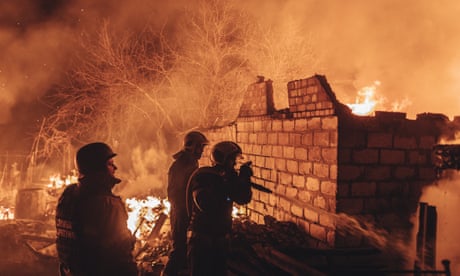Peter Beaumont and Pjotr Sauer report in The Guardian:
The head of the Russian Wagner mercenary group said his fighters have sometimes spent weeks attempting to capture a single house in Bakhmut, in the latest evidence of how the Kremlin’s efforts there have stalled. Prigozhin – a key ally of Putin – was filmed visiting a basement near the eastern front filled with the bodies of his fighters, many of them convicts, who had been killed during the bitter fighting for the city. "Sometimes they fight for weeks over one house. And behind this house, there is a new line of defense."
The head of the Russian Wagner mercenary group, Yevgeny Prigozhin, has said his fighters have sometimes spent weeks attempting to capture a single house in the key contested Donbas city of Bakhmut, in the latest evidence of how the Kremlin’s efforts there have stalled.
In a grim video released over new year, Prigozhin – a key ally of Putin – was filmed visiting a basement near the eastern front filled with the bodies of his fighters, many of them convicts, who had been killed during the bitter fighting for the city, a key Russian objective since the summer.
In the makeshift morgue, Prigozhin is seen being shown bodies on stretchers and in body bags. One pile of bagged bodies can be seen stacked shoulder-high in the corner of one of the rooms.
“Their contract has finished, they will go home next week,” Prigozhin can be heard saying, adding: “These are getting ready to be sent. We all work during New Year’s Eve.
“Here lie Wagner fighters who died at the front. They are now being put in zinc coffins and they will return home.”
As more bodies are seen being taken off a truck, Prigozhin can be heard offering new year greetings.
Wagner has played a key role in the Russian offensive against Bakhmut, with Ukrainian soldiers interviewed by the Guardian saying Wagner fighters were often used as shock troops in frontal assaults on their positions, while recently mobilised Russians are deployed in more defensive roles.
While it has long been suggested by Ukrainian sources, and Russian military blogs, that Wagner has suffered heavy losses in the months-long assault, the footage – and Prigozhin’s commentary – have underlined the heavy scale of the attrition.
In a second clip of footage from his visit to the eastern front, Prigozhin confirmed the difficulties his forces were encountering. “Everyone wants to know when we will capture [Bakhmut],” he explains, using the Russian name for the city, Artemovsk. “In Artemovsk, every house has become a fortress. Our guys sometimes fight for more than a day over one house. Sometimes they fight for weeks over one house. And behind this house, there is a new line of defense. How many such lines of defence are there in Artemovsk? Five hundred would probably not be an exaggeration.”
An unnamed Wagner soldier whom Prigozhin meets complains about the difficulties they are facing there. “We don’t have enough equipment, not enough BMP3 [armoured cars] and shells,” he says.
In separate footage from Bakhmut filmed on 2 January, a Ukrainian soldier named Kiyanyn describes the continuing combat. Amid the sound of shelling, he describes how fighters in his sector of the city have repelled several large-scale attacks against the city he calls “the fortress”.
“They were coming like insects. We had to resupply with ammo several times … The defence line is standing and holding.”
The latest fighting in the east came as Ukraine’s president, Volodomyr Zelenskiy, said Russia was preparing to step up its attacks on the country using Iranian-made exploding drones.
“We have information that Russia is planning a prolonged attack by Shaheds [exploding drones]” Zelenskiy said in his nightly video address late on Monday.
He said the goal was to break Ukraine’s resistance by “exhausting our people, [our] air defence, our energy”, more than 10 months after Russia invaded its neighbour.
Zelenskiy was speaking after the Russian president, Vladimir Putin, appeared to be exploring ways to regain momentum in his flawed war effort, which in recent months has been frustrated by a Ukrainian counteroffensive backed by western-supplied weapons.
In the latest embarrassment for the Kremlin, Ukrainian forces fired rockets at a facility in the eastern Donetsk region where Russian soldiers were stationed, killing 63 of them, according to Russia’s defence ministry. Other, unconfirmed reports put the death toll much higher.
It was one of the deadliest attacks on the Kremlin’s forces since the war began more than 10 months ago.
In the attack, Ukrainian forces fired six rockets from a Himars launch system, and two of them were shot down, a Russian defence ministry statement said.
However, the strategic communications directorate of Ukraine’s armed forces claimed on Sunday that about 400 mobilised Russian soldiers were killed in a vocational school building in Makiivka, and about 300 more were wounded. That claim could not be independently verified.
The Russian statement said the strike occurred “in the area of Makiivka” and did not mention the vocational school.
Many of the conscripts killed and wounded in the attack came from the country’s south-western Samara region, according to governor Dmitry Azarov, who told families to call the local military offices for more information.
An Orthodox commemorative service was held in the centre of Samara on Tuesday morning and flowers were laid at a Soviet-era war memorial in the city.
On several social media groups used by locals in Samara, relatives of the conscripts were continuing to search for information about their whereabouts.
“No one is picking up the phone at the enlistment office. How do I find out if my son is still alive,” one woman wrote.




















0 comments:
Post a Comment